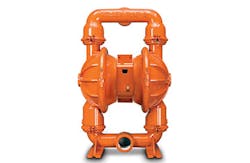Filter-press air distribution system reliability starts with its pumps
To produce reliable, long-lasting products, you must have production equipment and manufacturing processes that embody the same sought-for efficiency and high-level service.
At a West Warwick, Rhode Island, AMTROL manufacturing facility, waste-processing efficiency through recently installed filter presses was adversely affected by poor reliability of the air-operated double-diaphragm (AODD) pumps used in the 30-year-old air-distribution system.
By replacing the older system with pumps equipped with the Pro-Flo SHIFT ADS from Wilden, the company eliminated reliability issues, decreased pump maintenance, reduced waste-processing costs 60 percent and improved pump productivity 40 percent.
Founded in 1946, AMTROL is a market leader in thermal expansion tanks, well tanks, indirect water heaters, refrigerant and chemical cylinders, propane tanks and plumbing and HVAC accessories for residential, commercial and industrial markets.
At the seven-acre West Warwick facility, nine production lines produce metal tanks for plumbing, heating, Freon, propane and water storage. Processes include punch forming, hole punching, welding, grooving, assembling, testing, buffing, etching, painting and packaging.
The task at hand
Various kinds of waste products generated at each step are collected and disposed of properly. The largest quantity of waste generated is metal particulates containing primarily iron hydroxide, along with carbon steel, copper, brass, zinc, caustic acid and alkaline chemicals.
Waste processing begins by collecting particulates and chemicals in slurry tanks. Pretreatment separates oils and neutralizes caustic components.
Wilden AODD pumps transfer the sludge to laboratory holding tanks for final processing by three large, recently installed filter presses. Here sludge is separated into solids and water for proper disposal. Each filter press has eight 2-inch wide chambers, and each chamber is equipped with two 24-inch by 24-inch membrane plates.
AMTROL uses Wilden AODD pumps exclusively for all fluid-transfer applications at its manufacturing facilities.
Sludge is pumped into the chambers until they are full with solid "sludge cakes" formed from the concentrated waste. Water in the sludge is separated from waste materials as it passes through the filter-press membranes. Exiting the membranes, the now-clean water is disposed of in the municipal sewer system. Sludge cakes drop into a bin for disposal.
Overall, up to 9,600 gallons of waste sludge moves through the filter presses per day, producing more than 100 tons of "sludge cakes" per year.
Why it was better
While reliable workhorses, the 30-year-old Wilden M8 AODD pumps part of the original air-distribution system were a limiting factor when it came to reaching filter-press full potential.
The air-distribution system directs pressurized air to diaphragms that convert it into mechanical motion to push and retract the pump’s diaphragms, causing it to pump fluid.
Poor reliability of these older pumps and air-distribution units led to periodic waste-processing halts and downtime for pump repair. "Pump stalling was a problem," says Bob Perrotti, environmental and production manager. "Because the new filter presses were automated, they operated mostly unattended. As a result, if a pump stalled, it may not be discovered for a long period of time during which no waste is processed."
Dave Buckless, an account manager at the F.W. Webb Commercial and Industrial Pump Division, AMTROL’s pump supplier, suggested the company compare "the latest" with "the existing."
"I recommended pumps with the Pro-Flo SHIFT ADS because its cutting-edge technology was reliable, efficient and easy to install. It was an opportunity to evaluate the Pro-Flo SHIFT side-by-side with the current air-distribution system."
Wilden PS8 50-mm (2-inch) Original Series clamped AODD pumps equipped with the Pro-Flo SHIFT ADS immediately improved pump reliability. "The results were astounding," Perrotti says. "Mid-process stalling was eliminated. When a pump isn’t running, we know it’s because the filter press chambers are full. This solved several major issues. In addition, the bothersome maintenance task of monitoring ADS-unit oil levels and adding when they run low is eliminated. We no longer need to disassemble the pumps to restart them every time they stall."
How much better it was
Josh Hytinen, paint and environmental supervisor, says, "Cycle time has been reduced by nearly 40 percent, so we can expand our waste-processing capacity without additional equipment. The SHIFT has been a major benefit in improving our waste-processing capabilities without major capital investments."
The secret is a unique air-control spool that meters the air, to prevent overfilling without reduced performance. By limiting the air used to what’s needed to maintain the pump process, air consumption is lowered by up to 60 percent. The result is more product yield per standard cubic foot per minute of air consumption.
By replacing the 30-year-old ADS technology, the company was able to reduce the downtime of their AODD pumps, streamline the waste-management process, conserve energy, save money and reduce the total cost of ownership.
As operations at the West Warwick facility expand, the enhanced reliability and processing capacity of its filter presses will help it handle an increasing volume of waste products efficiently, cost effectively and on schedule. AODD pumps will play a role in assuring optimum filter-press operation based on their ability to deliver the required power, reliability and efficiency in high-demand operations.
Kevin Hogue is a Regional Manager for Wilden® and PSGl®. He can be reached at [email protected] or (973) 829-2272.
Based in Grand Terrace, California, Wilden is a leading brand of air-operated double-diaphragm (AODD) pumps. Wilden is part of PSG, a Dover Company, Oakbrook Terrace, Illinois.

